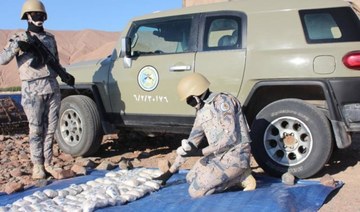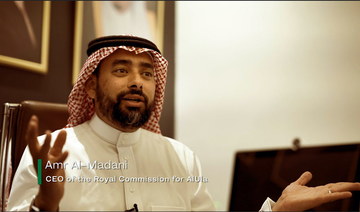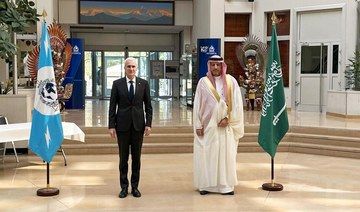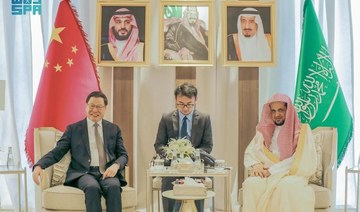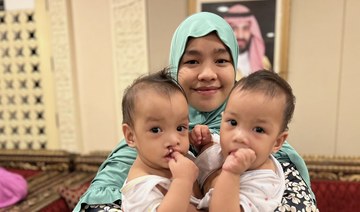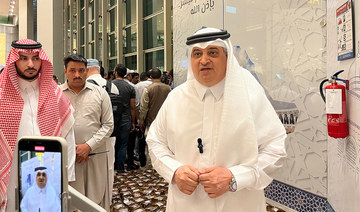NEW YORK: “Islamophobia is unfortunately pervasive everywhere,” Abdallah Al-Mouallimi, Saudi Arabia’s permanent representative to the UN, told a high-level international meeting on Wednesday.
It was organized by the Organization of Islamic Cooperation (OIC) to mark the first International Day to Combat Islamophobia. In response to an increase in attacks and other hate crimes targeting Muslims worldwide, the organization adopted a resolution in November last year calling for March 15 to be observed as a day to highlight and address the issue.
Fifty-seven countries, with a total population of 1.8 billion people, are members of the OIC. They include some, in West Africa and South America in particular, that are not Muslim-majority nations.
“Social media, hate speech and disinformation campaigns have made Islamophobia harder to address and eradicate,” said Al-Mouallimi, who stressed that any threat to the freedoms of one community based on the faith of its members is a threat to the religious freedoms of all.
Not only does the media perpetuate Muslim stereotypes through a “disproportionate” focus on the actions of individuals “perceived to be Muslims,” he said, it also plays an active role in spreading hatred. He called on the international community to come together to address this threat.
Speaking on behalf of Prince Faisal bin Farhan, the Kingdom’s foreign minister, Al-Mouallimi cited the words of the “Charter of Makkah,” which affirms that “religions and philosophies are exonerated from the sins committed by their adherents and claimants,” and that “true understanding of Islam requires an objective view that is devoid of stereotypical and prejudicial notions.”
The charter, adopted in the Holy City by the Muslim World League in May 2019, is a pan-Islamic set of principles that aim to counter extremism, advocate religious and cultural diversity, and support legislation against hate and violence. It was presented by Saudi Arabia’s King Salman, approved by the Islamic leaders of 139 countries, and signed by more than 1,200 prominent Muslims.
Al-Mouallimi also raised concerns about an increase in individual attacks against Muslims, and reminded those at the meeting that “personal behaviors should not be attributed to any religion or nationality. We underscore that the dissemination of hate speech jeopardizes the peace of society and serves the agenda of individual extremists to nourish their notion of hatred.”
The Saudi envoy called for an end to all “disproportionate measures” that target Muslims, and activities that stir up “religious intolerance, discrimination and violence.”
He reiterated the principles enshrined in the establishment of the International Day to Combat Islamophobia: a recognition of the growing threat from rising intolerance and sectarian violence; the importance of breaking perceived links that connect terrorism with any particular religion; and the need to raise awareness of acts of violence based on religion and condemn them.
Al-Mouallimi also welcomed a recent report by the UN Human Rights Council that concluded “suspicion, discrimination, and outright hatred” toward Muslims has risen to “epidemic proportions.”
It highlighted the disproportionate restrictions placed on Muslims manifesting or practicing their faith, limits on their access to citizenship, the socioeconomic exclusions they face, and the pervasive stigmatization of Muslim communities. These forms of discrimination, in the private and public spheres, “often make it difficult for a Muslim to be a Muslim,” the UN’s special rapporteur said in the report.
Muslims are frequently targeted based on visible characteristics of their faith, according to the report, such as their names, skin color and religious attire, including headscarves. The study also highlighted “the triple levels of discrimination” that Muslim women face because of their “gender, ethnicity and faith.”
The report — titled Countering Islamophobia/Anti-Muslim Hatred to Eliminate Discrimination and Intolerance Based on Religion or Belief — also examines “how Islamophobia perpetuates a vicious circle whereby state policy validates private Islamophobic attitudes and actions, and the prevalence of such attitudes can propel state policies that penalize Muslims; with stark consequences for the enjoyment of human rights, including freedom of religion or belief.”
It concludes that “cumulatively, in some contexts, such actions may amount to the level of coercion as prohibited under international law.”
UN Secretary-General Antonio Guterres told the meeting: “Unfortunately, far too often stereotypes are further compounded by elements of the media and some in positions of power.
“Anti-Muslim bigotry is sadly in line with other distressing trends we are seeing globally: a resurgence in ethno-nationalism, neo-Nazism, stigma and hate speech targeting vulnerable populations including Muslims, Jews, some minority Christian communities, as well as others.”
Although acts of intolerance might not always be recorded in official statistics, they “degrade people’s dignity and our common humanity,” Guterres said.
“Discrimination diminishes us all,” he added. “As the Holy Qur’an reminds us: nations and tribes were created to know one another.”
Calling for social cohesion and an end to bigotry, the UN chief said that fighting discrimination, racism and xenophobia is a priority for the organization.
Other guests at the meeting included President of the UN General Assembly Volkan Bozkir, OIC Secretary-General Yousef Al-Othaimeen, UN High Representative for the Alliance of Civilizations Miguel Angel Moratinos, and the foreign ministers of Iran, Turkey and Pakistan.
Saudi Arabia calls for greater tolerance as crimes against Muslims soar
https://arab.news/89vjn
Saudi Arabia calls for greater tolerance as crimes against Muslims soar
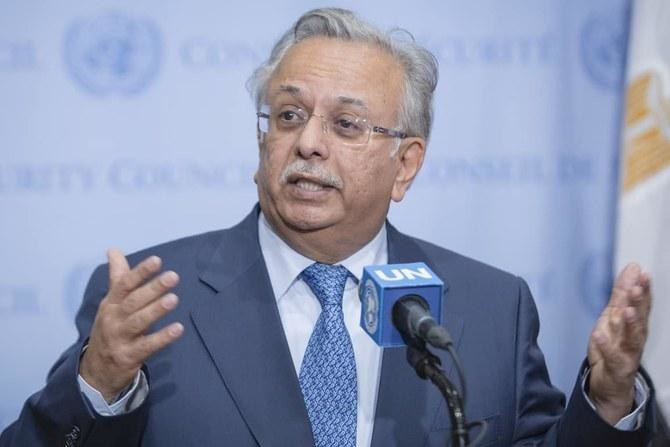
- ‘Social media, hate speech and disinformation’ are making it harder to tackle Islamophobia, envoy tells high-level meeting
- UN report found anti-Muslim hate has reached “epidemic proportions;” trend is fueled by media and some leaders, says Guterres
Saudi Border Guard arrest 4 attempting to smuggle qat
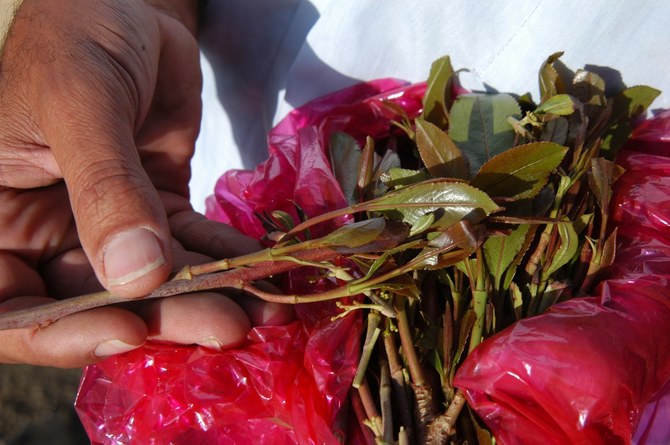
JAZAN: The Kingdom’s Border Guard in Al-Ardah, Jazan, recently arrested four Yemeni nationals attempting to smuggle 80 kg of qat into the country, the Saudi Press Agency reported on Monday.
Mostly chewed by users, Qat is a mild stimulant and illegal across most of the Arab world.
The government has urged citizens and residents to report any information they have regarding drug smuggling or sales to the General Directorate of Narcotics Control. Reports can be made by calling 911 for Makkah, Riyadh and the Eastern Province, and 999 for other regions. Alternatively, information can be emailed to [email protected]. All reports are treated confidentially.
KSrelief distributes food in Pakistan, drills solar-powered wells in Nigeria

DUBAI: KSrelief, Saudi Arabia’s aid agency, recently distributed 370 food baskets in the flood-hit Shangla district of Khyber Pakhtunkhwa province, Pakistan, benefiting 2,590 individuals.
The aid was a part of the fourth phase of the Kingdom’s Food Security Support Project in Pakistan 2024.
Last week, KSrelief, in collaboration with a civil society organization, initiated a project to drill six solar-powered medium-depth water wells in Kwara State, Nigeria. The wells, each at a depth of about 80 meters and equipped with tanks holding 5,000 liters, are for the benefit of 30,000 individuals.
The beneficiaries lauded Saudi Arabia for addressing their vital water needs.
Saudi anti-corruption authority reveals details of recent cases

- Spokesman said legal procedures had been initiated against all perpetrators
RIYADH: A spokesman for Saudi Arabia’s Oversight and Anti-Corruption Authority, also known as Nazaha, revealed on Sunday details of a number of criminal cases it recently investigated and prosecuted.
Outlining 20 of the most prominent corruption cases, he said legal procedures had been initiated against all perpetrators.
In one case, two Central Bank employees were arrested for receiving sums of money from a resident, who was also arrested, in exchange for depositing more than SR7.3 million ($1.95 million), without verifying the source, into bank accounts belonging to commercial entities over a two-year period.
In another case, a security officer working at the General Department of Traffic was arrested for receiving SR387,000 from the owner of a public services office, who was also arrested, in exchange for illegally amending the essential data of a group of vehicles.
One of the cases also highlighted involved an employee working at a university hospital who was arrested for receiving SR100,000 from citizens in exchange for a promise to employ them at the university.
Nazaha said it continues to work to identify and prosecute anyone in the Kingdom involved in the embezzlement of public funds, guilty of abuse of power and position for personal gain, or otherwise harming the public interest.
It stressed that guilty parties will be pursued and held accountable, and that there is no statute of limitations on such crimes.
Saudi, Bahraini public prosecutor meet in Manama
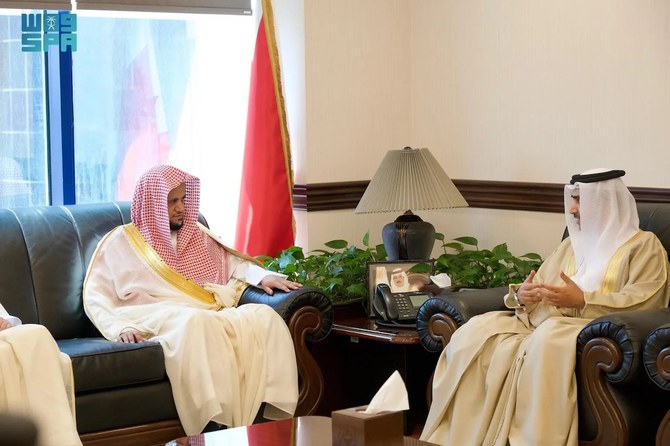
- Al-Mujeb highlighted the unwavering support the Kingdom's public prosecution receives from its leadership
RIYADH: Saudi Public Prosecutor Sheikh Saud bin Abdullah Al-Mujeb met with his Bahraini counterpart Ali bin Fadl Al Buainain in Manama, Saudi Press Agency reported on Sunday.
Al-Buainain welcomed Al-Mujeb and his accompanying delegation and expressed his delight at the visit, which he said signified the ongoing exchange of visits between the judicial bodies of the two nations and the sustained collaboration in combating transnational crime.
During the meeting, Al-Mujeb emphasized the deep-rooted historical ties between the Bahrain and the Kingdom and their continued advancement across various sectors, particularly in parliamentary cooperation and the exchange of information to ensure regional security.
He highlighted the unwavering support the Kingdom's public prosecution receives from its leadership, which he said enhanced the efficiency of its judicial processes.
Conjoined Filipino twins arrive in Riyadh for surgery

- Parents convey appreciation to King Salman, Crown Prince Mohammed bin Salman
RIYADH: Conjoined Filipino twins arrived in Riyadh from Manila on Sunday following a Saudi evacuation plan coordinated by the Ministry of Health, the Saudi Press Agency reported.
Akhizah and Ayeesha Yusoph were born in Panabo City in the Davao del Norte province on the southern island of Mindanao in December 2022. Their bodies share one liver.
The two 16-month-old girls arrived at King Khalid International Airport and traveled to the King Abdullah Specialized Children’s Hospital to be assessed to determine the feasibility of separation surgery.
Abdullah Al-Rabeeah, supervisor general of the Saudi aid agency KSrelief, thanked the Kingdom’s leadership for their support of the flagship Saudi Conjoined Twins Program.
The program, which is spearheaded by Al-Rabeeah, has operated on more than 130 children from 25 countries since 1990. The children were born sharing internal organs with their twin.
Al-Rabeeah spoke of the program’s global significance which marks a milestone in the field of medicine, while aligning with the ambitious goals of Saudi Vision 2030 to elevate the Kingdom’s healthcare services.
The parents of Akhizah and Ayeesha conveyed their heartfelt appreciation to King Salman and Crown Prince Mohammed bin Salman for the warm welcome and generous hospitality extended to them following their arrival in the Kingdom.





